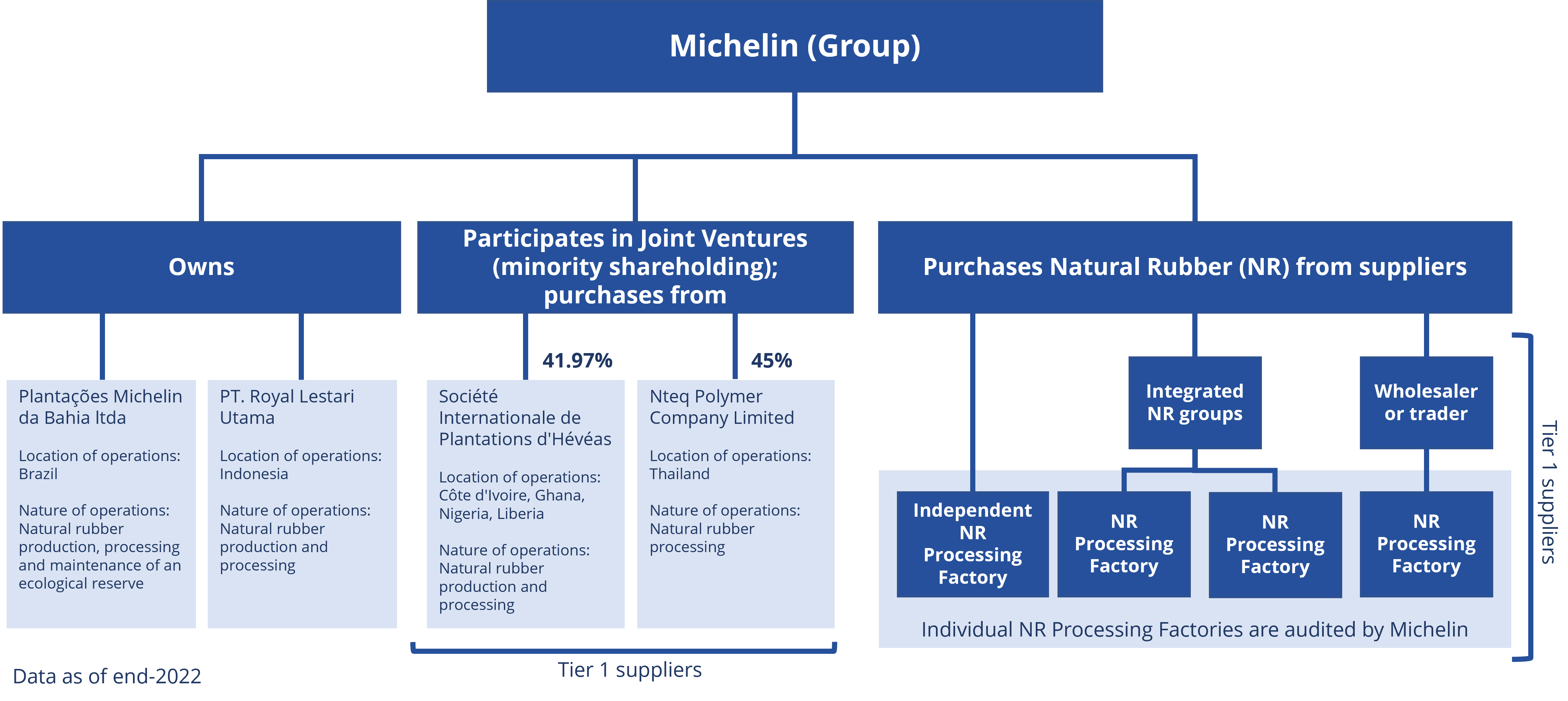Michelin sources natural rubber primarily from independent suppliers. These suppliers can be independent natural rubber processing factories, a group with multiple factories or traders (natural rubber wholesalers). In every case, Michelin conducts on-site audits, which through a pilot have now been expanded to include environmental and labor aspects, on individual natural rubber processing factories before they are added to an approved factory list. All suppliers, including groups and traders, have to abide by this list, meaning that all supply is known to the factory level. These are collectively known as ‘Tier 1’ suppliers.
Michelin participates in a number of natural rubber joint ventures, in which it maintains a minority shareholding ownership. These include joint venture operations in West Africa (Ivory Coast, Ghana, Nigeria and Liberia) and Thailand. Michelin maintains a presence on the boards of these joint ventures. Michelin also provides technical assistance to its joint ventures, particularly on agronomy, rubber processing and research and development. Michelin envisions its joint ventures to be leaders in sustainable and ethical practices, and as prime candidates for the development of new technologies that can reduce environmental impacts of natural rubber production or processing.
Michelin does own a limited number of natural rubber assets in Brazil and Indonesia. In Bahia, Brazil, Michelin’s land bank totals 4,578 ha, of which it dedicates 3,900 ha to the Michelin Ecological Reserve, which preserves a significant remnant of the southern Bahian Atlantic rainforest and is helping scientists understand the role industrial rubber plantations can play in landscape matrix alongside natural forest blocks. In 2022, the Michelin Group fully acquired Royal Lestari Utama (RLU). In this way, Michelin has reasserted its objectives and its commitment to producing sustainable natural rubber in Indonesia and to improving the living conditions of local communities.

Michelin sources natural rubber primarily from independent suppliers. These suppliers can be independent natural rubber processing factories, a group with multiple factories or traders (natural rubber wholesalers). In every case, Michelin conducts on-site audits, which through a pilot have now been expanded to include environmental and labor aspects, on individual natural rubber processing factories before they are added to an approved factory list. All suppliers, including groups and traders, have to abide by this list, meaning that all supply is known to the factory level. These are collectively known as ‘Tier 1’ suppliers.
Michelin participates in a number of natural rubber joint ventures, in which it maintains a minority shareholding ownership. These include joint venture operations in West Africa (Ivory Coast, Ghana, Nigeria and Liberia) and Thailand. Michelin maintains a presence on the boards of these joint ventures. Michelin also provides technical assistance to its joint ventures, particularly on agronomy, rubber processing and research and development. Michelin envisions its joint ventures to be leaders in sustainable and ethical practices, and as prime candidates for the development of new technologies that can reduce environmental impacts of natural rubber production or processing.
Michelin does own a limited number of natural rubber assets in Brazil and Indonesia. In Bahia, Brazil, Michelin’s land bank totals 4,578 ha, of which it dedicates 3,900 ha to the Michelin Ecological Reserve, which preserves a significant remnant of the southern Bahian Atlantic rainforest and is helping scientists understand the role industrial rubber plantations can play in landscape matrix alongside natural forest blocks. In 2022, the Michelin Group fully acquired Royal Lestari Utama (RLU). In this way, Michelin has reasserted its objectives and its commitment to producing sustainable natural rubber in Indonesia and to improving the living conditions of local communities.
Michelin sources natural rubber primarily from independent suppliers. These suppliers can be independent natural rubber processing factories, a group with multiple factories or traders (natural rubber wholesalers). In every case, Michelin conducts on-site audits, which through a pilot have now been expanded to include environmental and labor aspects, on individual natural rubber processing factories before they are added to an approved factory list. All suppliers, including groups and traders, have to abide by this list, meaning that all supply is known to the factory level. These are collectively known as ‘Tier 1’ suppliers.
Michelin participates in a number of natural rubber joint ventures, in which it maintains a minority shareholding ownership. These include joint venture operations in West Africa (Ivory Coast, Ghana, Nigeria and Liberia) and Thailand. Michelin maintains a presence on the boards of these joint ventures. Michelin also provides technical assistance to its joint ventures, particularly on agronomy, rubber processing and research and development. Michelin envisions its joint ventures to be leaders in sustainable and ethical practices, and as prime candidates for the development of new technologies that can reduce environmental impacts of natural rubber production or processing.
Michelin does own a limited number of natural rubber assets in Brazil and Indonesia. In Bahia, Brazil, Michelin’s land bank totals 4,578 ha, of which it dedicates 3,900 ha to the Michelin Ecological Reserve, which preserves a significant remnant of the southern Bahian Atlantic rainforest and is helping scientists understand the role industrial rubber plantations can play in landscape matrix alongside natural forest blocks. In 2022, the Michelin Group fully acquired Royal Lestari Utama (RLU). In this way, Michelin has reasserted its objectives and its commitment to producing sustainable natural rubber in Indonesia and to improving the living conditions of local communities.


 Link copied successfully
Link copied successfully